|
|
The candidate removes to the vicinity of the Midē´wigân
so as to be able to go through the ceremony of purgation four times
before the day of initiation. The sudatory having been constructed
on the usual site, east of the large structure, he enters it on the
morning of the fifth day preceding the initiation and after taking a
sweat-bath he is joined by the preceptor, when both proceed to the
four entrances of the Midē´wigân and deposit at each a small
offering of tobacco. This procedure is followed on the second and
third days, also, but upon the fourth the presents are also carried
along and deposited at the entrances, where they are received by
assistants and suspended from the rafters of the interior. On the
evening of the last day, the chief and officiating priests visit the
candidate and his preceptor, in the sweat-lodge, when ceremonial
smoking is indulged in followed by the recitation of Midē´ chants.
The following (Pl. XVI, A) is a reproduction of the chant taught to
and recited by the candidate. The original was obtained from an old
mnemonic chart in use at Mille Lacs, Minnesota, in the year 1825,
which in turn had been copied from a record in the possession of a
Midē´ priest at La Pointe, Wisconsin. Many of the words are of an
older form than those in use at the present day. Each line may be
repeated ad libitum.
|

Plate XVI.a. Mnemonic Song.
|
 |
Ni-ka´-ni-na´, ni-ka´-ni-na´, ni-ka´-ni-na´,
I am the Nika´ni, I am the Nika´ni, I am the Nika´ni,
man´-i-dō wig´-i-wam
win´-di-ge´-un.
I am going into the sacred lodge.
[The speaker compares himself to the Bear Man´idō,
and as such is represented at the entrance of the Midē´wigân.]
|
 |
Ni-ka´-ni-na´, ni-ka´-ni-na´, ni-ka´-ni-na´,
I am the Nika´ni, I am the Nika´ni, I am the Nika´ni,
ni-kan´-gi-nun´-da wé-mĭ-dŭk´.
I “suppose” you hear me.
[The lines from the ear denotes hearing; the words are
addressed to his auditors.]
|
 |
Wâ´, he-wa´-ke-wa ke-wâ´, he-wa´-ke-wâ´, wâ´.
He said, he said.
Signifies that Ki´tshi Man´idō, who is seen with the voice
lines issuing from the mouth, and who promised the
Ani´shinâ´bēg “life,”
that they might always live. |
 |
Rest. A ceremonial smoke is now indulged in. |
 |
We´-shki-nun´-do-ni-ne´,
ke-nosh´-ki-nun´-do-ni-ne´.
This is the first time you hear it.
[The lines of hearing are again shown; the words refer to
the first time this is chanted as it is an intimation that
the singer is to be advanced to the higher grade of the
Midē´wiwin.]
|
 |
Hwe´-na-ni-ka he-na´, he-nō´
mi-tē´-win-win´
gi´-ga-wa´-pi-no-dōn´.
You laugh, you laugh at the “grand medicine.”
[The arms are directed towards Ki´tshi Man´idō, the creator
of the sacred rite; the words refer to those who are
ignorant of the Midē´wiwin and its teachings.]
|
 |
Nun-te´-ma-ne´, hē´, wi´-na-nun´-te-ma-ne´
ki´-pi-nan´.
I hear, but they hear it not.
[The speaker intimates that he realizes the importance of
the Midē´ rite, but the uninitiated do not.]
|
 |
Pe´-ne-sŭi´-a
ke´-ke-kwi´-yan.
I am sitting like a sparrow-hawk.
The singer is sitting upright, and is watchful, like a hawk
watching for its prey. He is ready to observe, and to
acquire, everything that may transpire in the Midē´
structure. |
Upon the conclusion of the chant, the assembled Midē´ smoke and
review the manner of procedure for the morrow’s ceremony, and when
these details have been settled they disperse, to return to their
wig´iwams, or to visit Midē´ who may have come from distant
settlements.
Early on the day of his initiation the candidate returns to the
sudatory to await the coming of his preceptor. The gifts of tobacco
are divided into parcels which may thus be easily distributed at the
proper time, and as soon as the officiating priests have arrived,
and seated themselves, the candidate produces some tobacco of which
all present take a pipeful, when a ceremonial smoke-offering is made
to Ki´tshi Man´idō. The candidate then takes his Midē´ drum and
sings a song of his own composition, or one which he may have
purchased from his preceptor, or some Midē´ priest. The following is
a reproduction of an old mnemonic song which the owner, Sikas´sige,
had received from his father who in turn had obtained it at La
Pointe, Wisconsin, about the year 1800. The words are archaic to a
great extent, and they furthermore differ from the modern language
on account of the manner in which they are pronounced in chanting,
which peculiarity has been faithfully followed below. The
pictographic characters are reproduced in Pl. XVI, B. As usual, the
several lines are sung ad libitum, repetition depending entirely
upon the feelings of the singer.

Plate XVI.b. Mnemonic Song.
|
 |
Hin´-to-nâ-ga-ne´ o-sa-ga-tshī´-wēd
o-do´-zhi-tōn´.
The sun is coming up, that makes my dish.
The dish signifies the feast to be made by the singer. The
zigzag lines across the dish denote the sacred character of
the feast. The upper lines are the arm holding the vessel.
|
 |
Man´-i-dō i´-ya-nē´, ish´-ko-te´-wi-wa´-we-yan´.
My spirit is on fire.
The horizontal lines across the leg signify magic power of
traversing space. The short lines below the foot denote flames,
i.e., magic influence obtained by swiftness of communication with
the Man´idōs.
|
 |
Ko´tshi-hâ-ya-nē´, nē´,
ish´-ki-to´-ya-ni´, nin-do´-we-hē´,
wi´-a-we-yan´.
I want to try you, I am of fire.
[The zigzag lines diverging from the mouth signify voice, singing;
the apex upon the head superior knowledge, by means of which the
singer wishes to try his Midē´ sack upon his hearer, to give
evidence of the power of his influence.] |
 |
A pause. Ceremonial smoking is indulged in, after which the
chant is continued. |
 |
Ni-mī´-ga-sim´-ma man´-i-dō, sa-ko´-tshi-na´.
My mī´gis spirit, that is why I am stronger than you.
The three spots denote the three times the singer has received the
mī´gis by being shot; it is because this spirit is within him that
he is more powerful than those upon the outside of the wigiwam who
hear him.
|
 |
Mī´-ga-ye´-nin en´-dy-ân, ya´, hō´, ya´, man´-i-dō´-ya.
That is the way I feel, spirit.
The speaker is filled with joy at his power, the mī´gis within him,
shown by the spot upon the body, making him confident.
|
 |
Ya-gō´-sha-hī´, nâ´, ha´, ha´,
Ya-gō´-sha-hi´, man´-i-dō-wi´-yĭn.
I am stronger than you, spirit that you are.
[He feels more powerful, from having received three times the mī´gis,
than the evil spirit who antagonizes his progress in advancement.] |
Upon the completion of this preliminary by the candidate, the
priests emerge from the wig´iwam and fall in line according to their
official status, when the candidate and preceptor gather up the
parcels of tobacco and place themselves at the head of the column
and start toward the eastern entrance of the Midē´wigân. As they
approach the lone post, or board, the candidate halts, when the
priests continue to chant and drum upon the Midē´ drum. The chief
Midē´ then advances to the board and peeps through the orifice near
the top to view malevolent Man´idōs occupying the interior, who are
antagonistic to the entrance of a stranger. This spot is assumed to
represent the resting place or “nest,” from which the Bear Man´idō
viewed the evil spirits during the time of his initiation by the
Otter. The evil spirits within are crouching upon the floor, one
behind the other and facing the east, the first being
Mi-shi´-bi-shi´—the panther; the second, Me-shi´-kĕ—the turtle; the
third, kwin´-go-â´-gĭ—the big wolverine; the fourth, wâ´-gŭsh—the
fox; the fifth, ma-in´-gŭn—the wolf; and the sixth, ma-kwa´—the
bear. They are the ones who endeavor to counteract or destroy the
good wrought by the rites of the Midē´wiwin, and only by the aid of
the good Man´idōs can they be driven from the Midē´wigân so as to
permit a candidate to enter and receive the benefits of the degree.
The second Midē´ then views the group of malevolent beings, after
which the third, and lastly the fourth priest looks through the
orifice. They then advise the presentation by the candidate of
tobacco at that point to invoke the best efforts of the Midē´
Man´idōs in his behalf.
It is asserted that all of the malevolent Man´idōs who occupied and
surrounded the preceding degree structures have now assembled about
this fourth degree of the Midē´wigân to make a final effort against
the admission and advancement of the candidate: therefore he
impersonates the good Bear Man´idō, and is obliged to follow a
similar course in approaching from his present position the entrance
of the structure. Upon hands and knees he slowly crawls toward the
main entrance, when a wailing voice is heard in the east which
sounds like the word hān´, prolonged in a monotone. This is
ge´-gi-si´-bi-ga´-ne-dât Man´idō. His bones are heard rattling as he
approaches; he wields his bow and arrow; his long hair streaming in
the air, and his body, covered with mī´gis shells from the salt sea,
from which he has emerged to aid in the expulsion of the opposing
spirits. This being the information given to the candidate he
assumes and personates the character of the Man´idō referred to, and
being given a bow and four arrows, and under the guidance of his
preceptor, he proceeds toward the main entrance of the structure
while the officiating priests enter and station themselves within
the door facing the west. The preceptor carries the remaining
parcels of tobacco, and when the candidate arrives near the door he
makes four movements with his bow and arrow toward the interior, as
if shooting, the last time sending an arrow within, upon which the
grinning spirits are forced to retreat toward the other end of the
inclosure. The candidate then rushes in at the main entrance, and
upon emerging at the south suddenly turns and again employs his bow
and arrow four times toward the crowd of evil Man´idōs, who have
rushed toward him during the interval that he was within. At the
last gesture of shooting into the inclosure, he sends forward an
arrow, deposits a parcel of tobacco and crouches to rest at the
so-called “bear’s nest.” During this period of repose the Midē´
priests continue to drum and sing. Then the candidate approaches the
southern door again, on all fours, and the moment he arrives there
he rises and is hurried through the inclosure to emerge at the west,
where he turns suddenly, and imitating the manner of shooting arrows
into the group of angry Man´idōs within, he at the fourth movement
lets fly an arrow and gets down into the western “bear’s nest.”
After a short interval he again approaches the door, crawling
forward on his hands and knees until he reaches the entrance, where
he leaves a present of tobacco and is hastened through the inclosure
to emerge at the northern door, where he again turns suddenly upon
the angry spirits, and after making threatening movements toward
them, at the fourth menace he sends an arrow among them. The spirits
are now greatly annoyed by the magic power possessed by the
candidate and the assistance rendered by the Midē´ 263 Man´idōs, so
that they are compelled to seek safety in flight. The candidate is
resting in the northern “bear’s nest,” and as he again crawls toward
the Midē´wigân, on hands and knees, he deposits another gift of a
parcel of tobacco, then rises and is hurried through the interior to
emerge at the entrance door, where he turns around, and seeing but a
few angry Man´idōs remaining, he takes his last arrow and aiming it
at them makes four threatening gestures toward them, at the last
sending the arrow into the structure, which puts to flight all
opposition on the part of this host of Man´idōs. The path is now
clear, and after he deposits another gift of tobacco at the door he
is led within, and the preceptor receives the bow and deposits it
with the remaining tobacco upon the pile of blankets and robes that
have by this time been removed from the rafters and laid upon the
ground midway between the sacred Midē´ stone and the first Midē´
post.
The chief Midē´ priest then takes charge of the candidate, saying:
| Mi´-a-shi´-gwa |
wi-ka´-we-a´-kwa-mŭs-sin´-nŭk. |
Mī´-a-shi´-gwa |
| Now is the time |
[to take] the path that has
no end |
Now is the time |
| wi-kan´-do-we-ân´ |
mi´-ga-ī´-zhid wen´- |
dzhi-bi-mâ´-dis. |
| I shall inform you [of] |
that which I was told |
the reason I live. |
To this the second Midē´ priest remarks to the candidate,
Wa´-shi-gân´-do-we-an´ mi-gai´-i-nŏk´ wa´-ka-no´-shi-dzin—which
freely translated signifies: “The reason I now advise you is that
you may heed him when he speaks to you.” The candidate is then led
around the interior of the inclosure, the assistant Midē´ fall in
line of march and are followed by all the others present, excepting
the musicians. During the circuit, which is performed slowly, the
chief Midē´ drums upon the Midē´ drum and chants. The following,
reproduced from the original, on Pl. XVII, B, consists of a number
of archaic words, some of which are furthermore different from the
spoken language on account of their being chanted, and meaningless
syllables introduced to prolong certain accentuated notes. Each line
and stanza may be repeated ad libitum.

Plate XVII.b. Mnemonic Song.
|
 |
Man´-i-dō, hē´, nē´-yē´, man´-i-dō, hē´, nē´, yē´,
ēn´-da-na´-bi-yĕn
wen´-dō-bi´-yĕn.
A spirit, a spirit, you who sit there, who sit there.
[The singer makes a spirit of the candidate by thus giving him new
life, by again shooting into his body the sacred mīgis. The disk is
the dish for feast of spirits in the dzhibai´ Midē´wigân—“Ghost
Lodge,” the arms reaching towards it denoting the spirits who take
food therefrom. The signification is that the candidate will be
enabled to invoke and commune with the spirits of departed Midē´,
and to learn of hidden powers.]
|
 |
He´-ha-wa´-ni, yē´, he´-ha-wa´-ni, yē´,
na´-bi-nesh´-ga-na´-bi,
hī´, hē´.
These words were chanted, while the following are those as spoken,
apart from the music.
Â-wan´-ō-de´-no-wĭn nī´-bi-dĕsh´-ka-wĭn un´-de-no´-wĭn.
The fog wind goes from place to place whence the wind blows.
[The reason of the representation of a human form was not
satisfactorily explained. The preceptor felt confident, however,
that it signified a Man´īdō who controls the fog, one different from
one of the a-na´-mi-ki´, or Thunderers, who would be shown by the
figure of an eagle, or a hawk, when it would also denote the
thunder, and perhaps lightning, neither of which occurs in
connection with the fog.] |
 |
Rest. |
 |
Man´-i-dō´-we ni´-mi-nan´ ku-ni´-ne man-to´-ke ni´-mi-ne´.
I who acknowledge you to be a spirit, and am dying.
The figure is an outline of the Midē´wigân with the sacred Midē´
stone indicated within, as also another spot to signify the place
occupied by a sick person. The waving lines above and beneath the
oblong square are magic lines, and indicate magic or supernatural
power. The singer compares the candidate to a sick man who is
seeking life by having shot into his body the mī´gis.
|
 |
Ga-kwe´-in-nân´ tshi-ha´-gĕ-nâ´ ma-kwa´ ni-go´-tshi-ni´.
I am trying you who are the bear.
The Midē´ who is chanting is shown in the figure; his eyes are
looking into the candidate’s heart. The lines from the mouth are
also shown as denoting speech, directed to his hearer. The horns are
a representation of the manner of indicating superior powers.
|
 |
Pĭ-nē´-si ka´-ka-gī´-wai-yan´ wen´-dzhi man´-i-dō´wid.
The bird, the crow bird’s skin is the reason why I am a spirit.
Although the crow is mentioned, the Thunder-bird (eagle) is
delineated. The signification of the phrase is, that the speaker is
equal in power to a Man´idō, at the time of using the Midē´
sack—which is of such a skin.
|
 |
Tshin-gwe´-wi-he´-na nē´, kan´, tshi-wâ´-ba-ku-nēt´.
The sound of the Thunder is the white bear of fire.
The head is, in this instance, symbolical of the white bear Man´idō;
the short lines below it denoting flame radiating from the body, the
eyes also looking with penetrating gaze, as indicated by the double
waving lines from each eye. The white bear Man´idō is one of the
most powerful Man´idōs, and is so recognized.
|
By the time this chant is completed the head of the procession
reaches the point of departure, just within the eastern door, and
all of the members return to their seats, only the four officiating
Midē´ remaining with the candidate and his preceptor. To search
further that no malevolent Man´idōs may remain lurking within
the Midē´wigân, the chief priests lead the candidate in a zigzag
manner to the western door, and back again to the east. In this way
the path leads past the side of the Midē´ stone, then right oblique
to the north of the heap of presents, thence left oblique to the
south of the first-degree post, then passing the second on the
north, and so on until the last post is reached, around which the
course continues, and back in a similar serpentine manner to the
eastern door. The candidate is then led to the blankets, upon which
he seats himself, the four officiating priests placing themselves
before him, the preceptor standing back near the first of the four
degree posts.
The Midē´ priest of the fourth rank or place in order of precedence
approaches the kneeling candidate and in a manner similar to that
which has already been described shoots into his breast the mī´gis;
the third, second and first Midē´ follow in like manner, the last
named alone shooting his mī´gis into the candidate’s forehead, upon
which he falls forward, spits out a mī´gis shell which he had
previously secreted in his mouth, and upon the priests rubbing upon
his back and limbs their Midē´ sacks he recovers and resumes his
sitting posture.
The officiating priests retire to either side of the inclosure to
find seats, when the newly received member arises and with the
assistance of the preceptor distributes the remaining parcels of
tobacco, and lastly the blankets, robes, and other gifts. He then
begins at the southeastern angle of the inclosure to return thanks
for admission, places both hands upon the first person, and as he
moves them downward over his hair says: Mi-gwĕtsh´ ga-o´-shi-tō´-ĭn
bi-mâ´-dĭ-sĭ-win—“Thanks, for giving to me life.” The Midē´
addressed bows his head and responds, hau´,
ēn´,—yes when the newly
admitted member steps back one pace, clasps his hands and inclines
his head to the front. This movement is continued until all present
have been thanked, after which he takes a seat in the southeastern
corner of the inclosure.
A curious ceremony then takes place in which all the Midē´ on one
side of the inclosure arise and approach those upon the other, each
grasping his Midē´ sack and selecting a victim pretends to shoot
into his body the mī´gis, whereupon the Midē´ so shot falls over,
and after a brief attack of gagging and retching pretends to gain
relief by spitting out of his mouth a mī´gis shell. This is held
upon the left palm, and as the opposing party retreat to their
seats, the side which has just been subjected to the attack moves
rapidly around among one another as if dancing, but simply giving
rapid utterance to the word hŏ´, hŏ´, hŏ´, hŏ´, hŏ´, hŏ´, and
showing the mī´gis to everybody present, after which they place the
flat hands quickly to the mouth and pretend again to swallow their
respective shells. The members of this party then similarly attack
their opponents, who 266 submit to similar treatment and go through
like movements in exhibiting the mī´gis, which they again swallow.
When quiet has been restored, and after a ceremonial smoke has been
indulged in, the candidate sings, or chants, the production being
either his own composition or that of some other person from whom it
has been purchased. The chant presented herewith was obtained from
Sikas´sigĕ, who had received it in turn from his father when the
latter was chief priest of the Midē´wiwin at Mille Lacs, Minnesota.
The pictographic characters are reproduced on Pl. XVII, A, and the
musical notation, which is also presented, was obtained during the
period of my preliminary instruction. The phraseology of the chant,
of which each line and verse is repeated ad libitum as the singer
may be inspired, is as follows:
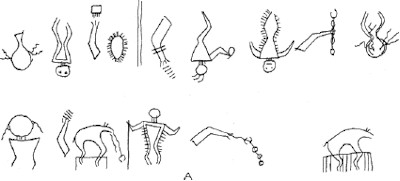
Plate XVII.a. Mnemonic Song.
|
 |
Do-nâ´-ga-nī´, Na´-wa-kwe´ in-do´-shi-tōn´, do-nâ´-ga-nī´.
My dish,
At noon I make it, my dish.
The singer refers to the feast which he gives to the Midē´ for
admitting him into the Midē´wiwin.
|
| |
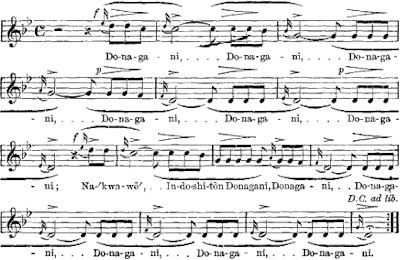
Do-na-ga-ni, Do-na-ga-ni, Do-na-ga-ni, Do-na-ga-ni,
Do-na-ga-ni, Do-na-ga-ni; Na-´kwa-wē´, In-do-shi-tōn Donagani,
Donaga-ni, Do-na-ga-ni, Do-na-ga-ni, Do-na-ga-ni, Do-na-ga-ni.
|
 |
Man´-ī-dō´ i-yan-nī´, Esh-ko´-te nin´-do-we´-yo-wĭn´,
I am such a spirit, My body is made of fire.
His power reaches to the sky, i.e., he has power to invoke the aid
of Ki´tshi Man´idō. The four degrees which he has received are
indicated by the four short lines at the tip of the hand.
|
| |
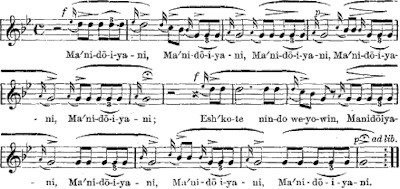
Ma´ni-dō-i-ya-ni, Ma´ni-dō-i-ya-ni, Ma´ni-dō-i-ya-ni,
Ma´ni-dō-i-ya-ni, Ma´ni-dō-i-ya-ni;
Esh´ko-te nin-do we-yo-win, Manidōiya-ni, Ma´ni-dō-i-ya-ni,
Ma´ni-dō-i-ya-ni, Ma´ni-dō-i-ya-ni.
|
 |
Kŏ´-tshi-hai´-o-nī´,
Esh-ko´-te wa-ni´-yō.
I have tried it, My body is of fire.
He likens himself to the Bear Man´idō, and has like power by virtue
of his mī´gis, which is shown below the lines running downward from
the mouth. He is represented as standing in the Midē´wigân—where his
feet rest.
|
| |
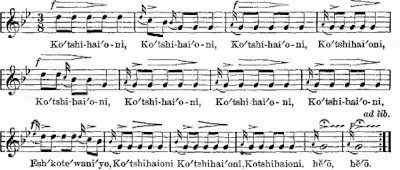
Ko´tshi-hai´o-ni, Ko´tshi-hai´o-ni, Ko´tshi-hai´o-ni,
Ko´tshihai´oni, Ko´tshi-hai´o-ni, Ko´tshi-hai´o-ni,
Ko´tshi-hai´o-ni, Ko´tshi-hai´o-ni, Esh´kote´wani´yo, Ko´tshihaioni.
Ko´tshihai´oni, Kotshihaioni, hĕ´ō, hĕ´ō. |
 |
Pause. An offering of smoke is made to Ki´tshi Man´idō. |
 |
Ni-mī´-gi-sĭm´ man´-i-dō´-we, hwē´, hē´,
Sha´-go-dzhĭ´-hi-na´.
My mī´gis spirit, I overpower death with.
[His body is covered with mī´gis as shown by the short lines
radiating from the sides, and by this power he is enabled to
overcome death.]
|
| |
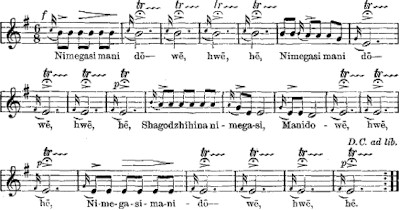
Nimegasi mani dō-wē, hwē, hē, Nimegasi mani dō-wē, hwē, hē,
Shagodzhihinani-mega-si, Manido-wē, hwē, hē.
Ni-me-ga-si-ma-ni-dō-wē, hwē, hē.
|
 |
Ni´-ka-ni´ nin-man´-e-dō´-we-ya´.
Ya´-ho-ya´ man´-i-dō´-wa
nin-da´-ho-ha´.
That is the way with me, spirit that I am.
[The hand shows how he casts the mī´gis forward into the person
requiring life. He has fourfold power, i.e., he has received the
mī´gis four times himself and is thus enabled to infuse into the
person requiring it.]
|
| |

Ni´-ga-ne´ nin ma´ni-dō´we ya
Ni´-ga-ne´ nin ma´ni-dō´we ya,
Ya´ho-ya´ ma´nidō-we,
Nin´dohōha ni´gane, ma´ni-dō-we, ya, hē.
|
 |
Ē-kotsh´-i-na´-ha,
Ē-kotsh´-ha man´-i-dō´ hwe-do´-wī.
I hang it, I hang up the Spirit sack.
[After using his Midē´ sack he hangs it against the wall of the
Midē´wigân, as is usually done during the ceremonial of initiation.]
|
| |
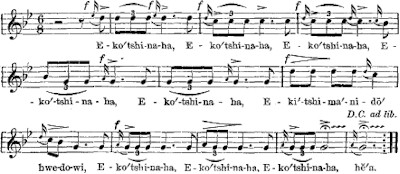
E-ko´tshi-na-ha, E-ko´tshi-na-ha, E-ko´tshi-na-ha,
E-ko´-tshi-na-ha, E-ko´-tshi-na-ha,
E-ki´-tshi-ma´-ni-dō´ hwe-do-wi, E-ko´tshi-na-ha,
E-ko´tshi-na-ha, E-ko´tshi-na-ha, hĕ´a.
|
 |
He´-a-wi-non´-dam-a´-ni,
Man´-i-dō´ mi-de´-wi-he´
ne´-ma-da´-wi-dzig´.
Let them hear, Midē´ spirit, those who are sitting around.
[He invokes Ki´tshi Man´idō to make his auditors understand his
power.]
|
| |
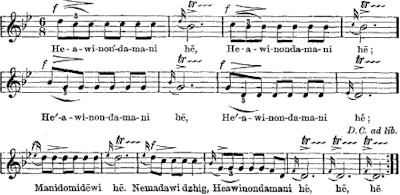
He-a-wi-non´-da-ma-ni hē, He-a-wi-nonda-ma-ni hē;
He´-a-wi-non-da-ma-ni hē, He´-a-wi-non-da-ma-ni hē;
Manidomidēwi hē, Nemadawi dzhig, Heawinondamani hē, hē, hē.
|
 |
He´-a-we-na´ ni´-we-dō´,
Man´-i-dō´ we-a-nī´
Ni´-ka-nā´
ni´-na-nā´.
He who is sleeping, The Spirit, I bring him, a kinsman.
[In the employment of his powers he resorts to the help of Ki´tshi
Man´idō—his kinsman or Midē´ colleague.]
|
| |
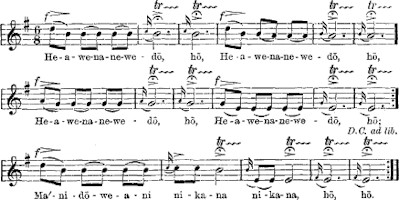
He-a-we-na-ne-we-dō, hō, He-a-we-na-ne-we-dō, hō,
He-a-we-na-ne-we-dō, hō, He-a-we-na-ne-we-dō, hō;
Ma´-ni-dō-we-a-ni ni-ka-na ni-ka-na, hō, hō.
|
 |
Man´-i-dō´ we-a-nī´
Esh-ke´-ta we´-a-nĭ´ man´-i-dō´ we´-a-nĭ´.
I am a spirit, Fire is my spirit body.
[The hand reaches to the earth to grasp fire, showing his ability to
do so without injury and illustrating in this manner his
supernatural power.]
|
| |
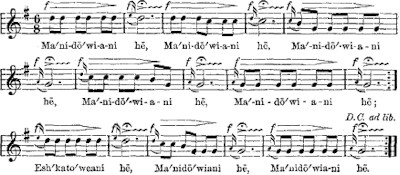
Ma´ni-dō´wi-a-ni hē, Ma´ni-dō´wi-a-ni hē, Ma´-ni-dō´-wi-a-ni hē,
Ma´-ni-dō´-wi-a-ni hē, Ma´-ni-dō´wi-a-ni hē;
Esh´kato´weani hē, Ma´nidō´wiani hē, Ma´nidō´wia-ni hē.
|
 |
Ai-ya´-swa-kĭt-te´, hē´, he´,
He´-ā´ se-wī´-kit-te´, hē´, hē´
Na-se´-ma-gŏt´ nin-dē´.
It is leaning,
My heart breathes.
[The phrase refers to the mī´gis within his heart. The short
radiating lines indicate the magic power of the shell.]
|
| |
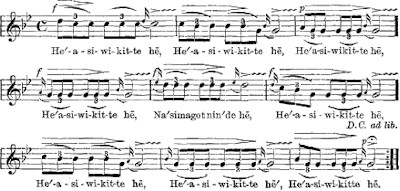
He´-a-si-wi-kit-te hē, He´-a-si-wi-kit-te hē, He´a-si-wikit-te hē,
He´a-si-wi-kit-te hē, Na´simagot nin´de hē, He´-a-si-wi-kit-te hē,
He´-a-si-wi-kit-te hē, He´-a-si-wi-kit-te hē´, He´a-si-wi-kitte hē. |
 |
Rest, or pause, after which dancing accompanies the remainder of the
song. |
 |
Ni-ka´-nin-ko´-tshi´-ha ni´-ka-na
Ni-ka´-na-nin-ko´-tshi-ha.
Midē´ friends, I am trying, Midē´ friends, Midē´ friends, I am
trying.
[His hand and arm crossed by lines to denote magic power, in
reaching to grasp more than four degrees have given him; he has in
view a fifth, or its equivalent.] |
| |

Ni´-ka-ni ko´tshiha Ni´ka-ni ha,
Ni´-ka-ni ko´tshini Ni´-ka-ni ha,
Ni´-ka-ni ko´-tshi-ha Ni´-ka-ni ha.
|
 |
Hi´-ne-na-wa´ ni-be´-i-dōn´ ni-di´-na.
I hold that which I brought, and told him.
The singer is holding the mī´gis and refers to his having its power,
which he desires Ki´tshi Man´idō to augment. |
| |

He-ne-na-wa-ni-bei-dōn, He-ne-na-wa-ni-bei-dōn,
He-ne-na-wa-ni-bei-dōn, He-ne-na-wa-ni-bei-dōn.
|
 |
Ye´-we-ni´-mi-dē´, hwa´, da´, Ke-wa´-shi-mi-dē´, hĭ-a, hwē´,
Ye´-we-ni´-mi-dē?
Who is this grand Midē´? You have not much grand medicine.
Who is
the Midē´?
[The first line, when used with the music, is a´-we-nin-o´-au-Midē´.
The whole phrase refers to boasters, who have not received the
proper initiations which they profess. The figure is covered with
mī´gis shells, as shown by the short lines attached to the body.]
|
| |
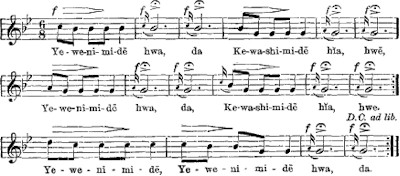
Ye-we-ni-mi-dē hwa, da. Ke-wa-shi-mi-dē hĭa, hwē,
Ye-we-ni-mi-dē hwa, da. Ke-wa-shi-mi-dē hĭa, hwe.
Ye-we-ni-mi-dē, Ye-we-ni-mi-dē hwa, da.
|
 |
Nai´-a-na-wi´ na-ma´, ha´, Wa-na´-he-ne-ni-wa´, ha´,
O´-ta-be-we-ni´,
mē´, hē´.
I can not reach it, Only when I go round the Midē´wigân; I can not
reach it from where I sit.
[The mī´gis attached to the arrow signifies its swift and certain
power and effect. The first line of the phrase, when spoken, is
nin-na´-na-wi-nan´.]
|
| |
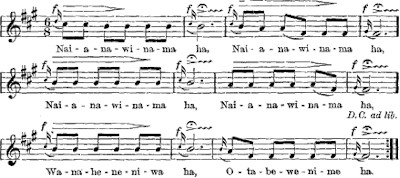
Nai-a-na-wi-na-ma ha, Nai-a-na-wi-na-ma ha,
Nai-a-na-wi-na-ma ha, Nai-a-na-wi-na-ma ha,
Wa-na-he-ne-ni-wa ha, O-ta-be-we-ni-me ha.
|
 |
Ai-yā´ ha´-na-wi´-na-ma´.
I can not strike him.
The speaker is weeping because he can not see immediate prospects
for further advancement in the acquisition of power. The broken ring
upon his breast is the place upon which he was shot with the mī´gis.
|
| |
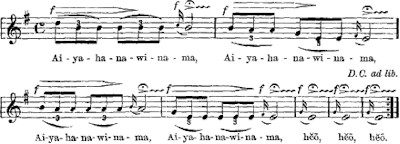
Ai-ya-ha-na-wi-na-ma, Ai-ya-ha-na-wi-na-ma,
Ai-ya-ha-na-wi-na-ma, Ai-ya-ha-na-wi-na—ma, hĕō, hĕō,
hĕō. |
The following musical notation presents accurately the range of
notes employed by the preceptor. The peculiarity of Midē´ songs lies
in the fact that each person has his own individual series of notes
which correspond to the number of syllables in the phrase and add
thereto meaningless words to prolong the effect. When a song is
taught, the words are the chief and most important part, the musical
rendering of a second person may be so different from that of the
person from whom he learns it as to be unrecognizable without
the words. Another fact which often presents itself is the absence
of time and measure, which prevents any reduction to notation by
full bars; e.g., one or two bars may appear to consist of four
quarter notes or a sufficient number of quarters and eighths to
complete such bars, but the succeeding one may consist of an
additional quarter, or perhaps two, thus destroying all semblance of rythmic continuity. This peculiarity is not so common in dancing
music, in which the instruments of percussion are employed to assist
regularity and to accord with the steps made by the dancers, or vice
versa.
In some of the songs presented in this paper the bars have been
omitted for the reasons presented above. The peculiarity of the
songs as rendered by the preceptor is thus more plainly indicated.
When the chant is ended the ushers, who are appointed by the chief
Midē´, leave the inclosure to bring in the vessels of food. This is
furnished by the newly elected member and is prepared by his female
relatives and friends. The kettles and dishes of food are borne
around four times, so that each one present may have the opportunity
of eating sufficiently. Smoking and conversation relating to the
Midē´wiwin may then be continued until toward sunset, when, upon an
intimation from the chief Midē´, the members quietly retire, leaving
the structure by the western door. All personal property is removed,
and upon the following day everybody departs.
This site includes some historical
materials that may imply negative stereotypes reflecting the culture or language
of a particular period or place. These items are presented as part of the
historical record and should not be interpreted to mean that the WebMasters in
any way endorse the stereotypes implied. The Midē Wiwin or Grand Medicine Society, 1891
The Midē Wiwin or Grand Medicine Society
 |

